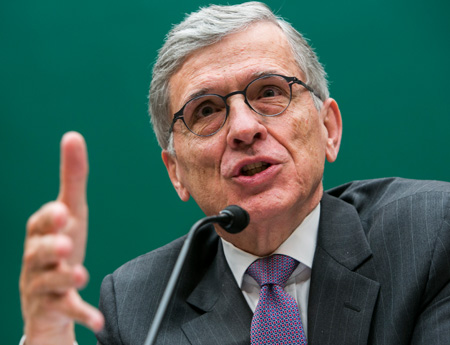Wheeler Comes Out Swinging in Title Fight

The smarter way to stay on top of broadcasting and cable industry. Sign up below
You are now subscribed
Your newsletter sign-up was successful
FCC chairman Tom Wheeler, a notable fan of history, decided to make some last week, firing the shot heard ’round the communications world by circulating a draft order of new network neutrality rules, based on reclassifying Internet service providers under Title II regulations.
The rules will apply to mobile broadband and fixed, but Wheeler said they will not include rate regulation or last-mile unbundling.
The chairman must still get two more votes—which won’t be coming from the Republicans on the commission—when he officially votes the final order, planned for Feb. 26.
“Using this authority, I am submitting to my colleagues the strongest open Internet protections ever proposed by the FCC,” Wheeler said in a bylined post on Wired.com, opting to make his announcement on the tech-oriented magazine’s site. “These enforceable, bright-line rules will ban paid prioritization, and the blocking and throttling of lawful content and services. I propose to fully apply—for the first time ever—those bright-line rules to mobile broadband.”
ISPs were already bracing for the blow, which the chairman had telegraphed—an appropriate metaphor, as it turns out, since the chairman has argued that broadband is at a regulatory moment similar to the advent of the old wire service.
Wheeler initially proposed using the FCC’s Sec. 706 authority to set a commercially reasonable standard for Internet openness, but stated in the piece he rethought this move after deciding that, down the road, this standard could be interpreted to mean what was reasonable for “commercial interests,” not consumers. That compelled him to change course.
It also probably did not hurt that President Obama came out in support of Title II.
The smarter way to stay on top of broadcasting and cable industry. Sign up below
Lining Up
In a blog post early last week, AT&T previewed its legal arguments in the court challenge that is now sure to come, likely from more than one direction.
Hank Hultquist, AT&T VP, federal regulatory issues, blogged that “the FCC cannot mandate that a service be offered on a common carrier basis without, at a minimum, a finding that a particular provider has market power in a particular geographic market. Needless to say the FCC has engaged in no analysis of market power on a geographic market basis. Accordingly, this option is simply not available to the FCC.” FCC officials last week said they disagreed with that assessment and were confident of victory in court.
Hultquist noted the FCC will have to grapple with that “when” not “if” it is required to defend Title II reclassification before an appellate court. He also said that anyone suggesting Title II is bulletproof is fooling him or herself.
Earlier last week, in another context, a senior FCC official pointed out that, given the vast amount of FCC decisions being challenged in court, those documents are written with legal defense in mind. Of course, that did not prevent the D.C. Circuit from reversing previous net neutrality rules for lack of sufficient legal justification. It also didn’t prevent the continued controversy over the draft.
“In the nearly forty years that I have been heavily involved in communications law and policy, including serving for a time as FCC associate general counsel, this is certainly one of the most momentous decisions of the agency—and, undoubtedly, one of the most misguided and likely harmful ones,” blogged Randolph May, president of free market think tank The Free State Foundation.
MINDING THE STORE
The FCC has asked Congress for an extra $2.5 million for fiscal year 2016 in part to make sure it doesn’t end up paying broadcasters or cable operators too much when covering relocation costs of repacking TV stations after the incentive auction.
That is according to the briefing book for the budget the FCC submitted last week.
The commission indicated the money was to pay for someone to administer the Broadcaster Relocation Fund (cable operators will also be paid out of that fund) and to reasonably ensure that whomever they get to run it has “implemented sufficient internal controls to prevent waste, fraud and abuse.”
The statute has set aside $1.75 billion to reimburse broadcasters who are moved or have to share channels after the auction, and for additional equipment required by cable operators who must re-tune head-ends.
The FCC is also anticipating some viewer issues with the channel changes post-auction. Commission officials indicated that it is “mission critical” for them to hire more staffers to operate the FCC Call Center and reach out to viewers, anticipating “increased volume [of calls] related to television channel changes caused by the incentive auctions.”
Contributing editor John Eggerton has been an editor and/or writer on media regulation, legislation and policy for over four decades, including covering the FCC, FTC, Congress, the major media trade associations, and the federal courts. In addition to Multichannel News and Broadcasting + Cable, his work has appeared in Radio World, TV Technology, TV Fax, This Week in Consumer Electronics, Variety and the Encyclopedia Britannica.

